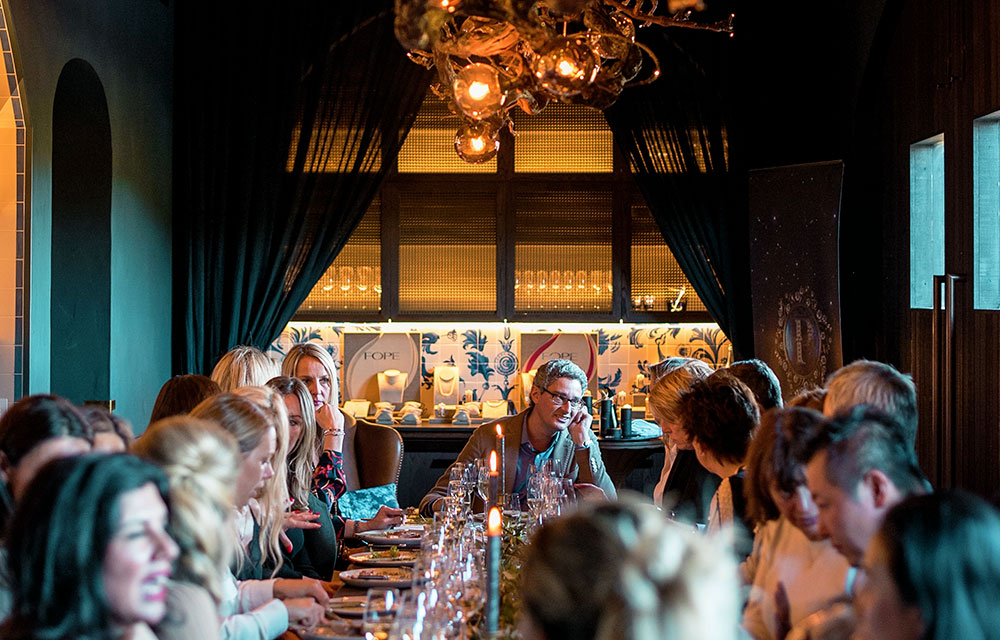Many of our clients in hotel marketing and some in special event marketing already know the acronym “DMC” and what these “destination management companies” do in the corporate group event industry. For those who don’t, DMCs act as on-the-ground experts in particular destinations to help corporate planners and their groups take full advantage of an area and all it has to offer. Their services range from logistics and transportation to the finer touches like creative corporate event concepts and decor. In other words: They live, eat, and breath corporate group business in those destinations.
Any DMC professional is thus filling their daily cup with expertise on corporate group business; we know firsthand that Shelly Archer’s cup overflows with that knowledge. Archer has worked in the industry since 2004 and is a partner at 360 Destination Group, a DMC with offices around the country and a Hawthorn client since 2011. 360DG brought us on last year to overhaul their marketing strategy and efforts ranging from a new enterprise website and marketing automation to email marketing and collateral.
But we’re not here to talk about our work. Since we know so many of our clients in hospitality, destination, and event marketing are looking to supplement that leisure and weekend business with weekend corporate groups, we thought we’d turn the tables. In this Q&A, we tap Archer’s wealth of knowledge to help hotels and venues make adjustments to their hotel promotion, group sales strategies, and on-the-ground programming. She touches on why corporate planners are looking beyond Vegas (a good thing for our clients), how boutique hotels and smaller venues can still capture midweek corporate business, and how to position your venue for different types of corporate groups.
What are some things that corporate planners are looking for in a host venue these days?
Flexibility is the key right now, because hotels are being booked up far in advance. It’s a seller’s market. So for a corporate planner looking to place a group, I would say that they value availability and flexibility – flexibility with their space, flexibility with rates, flexibility with fees that can be waived. Also uniqueness – smaller hotels should tout their privacy and uniqueness. Planners get used to the big hotels because they offer a ton of space, but you lose that sense of privacy. So smaller hotels can highlight the fact that they can make a group feel like they’re the only ones in the hotel or venue.
Hotels that aren’t in metro centers can have a tough time securing group business. What are some ways that great vacation destination hotels or venues can get corporate planners’ ears about booking with them in more difficult-to-reach locations?
They could offer clients a transportation credit — let’s say $1,000 or $2,500 — and absorb the cost of transportation for the group from the airport to the venue. In fact, I would play up the remoteness.
How can being hard to get to be a benefit for hotels and venues?
It gives the client a chance to capture the attention of their group without any distractions. That’s partly why planners don’t go to Vegas, because they feel like there are too many distractions. If you’re in a faraway, remote area, you can get attendees’ attention.
What has changed about what corporate planners are looking for now, versus, say, five years ago?
The biggest trend I see is the shift to a sellers’ market. A few years ago, it was a buyers’ market. The economy is better, people are booking more meetings, and they’re booking them further out. They’re checking availability not just for this year, but when they see that it’s already close to full, they book for 2018 and 2019, too. So all of the sudden, availability for hotel space is at a premium. And because the rates go up, planners are trying to lock in rates now because they’re worried those rates will keep going up. So, that’s an advantage for a smaller property – you could do a social media or email promotion highlighting your availability during hot dates like fall and spring, when everyone is scrambling to book.
Any tips for smaller venues and hotels with group capacity of 100 or fewer?
With that small a group, you can be a little more fluid. Instead of being confined to the ballroom, maybe you meet somewhere else and take advantage of the property. Or, you can go off-site and take them to a local venue or restaurant. Since it’s a smaller group, you have more flexibility where you can place them. So it’s important that small venues sell themselves on those attributes, and also sell how that flexibility can be customized.
How do you look at sub-segments of corporate groups and how particular details make landing corporate group business for each different?
An incentive group is really basically wining and dining. There may be a bit of time for meetings, but the remainder of it is fun and relaxing. So if you’re going after incentive group business, you could put together some promotion that shows your hotel or venue’s combination of the necessary meeting space but also really focuses on the ways that fun can be had at your doorstep. At 360DG, we make a day-by-day grid that lays out in a visual format what a typical three- or four-day program may look like. A hotel could do something similar. You could do multiple grids – one for executive retreats, one for sales incentive trips, one for conferences, etc. Conferences are the meat and potatoes. There, you almost play down the fun stuff. But in those, maybe you play up the conveniences – “it’s an intimate area,” “there are places for conversation where people can break off to have one-on-ones,” etc. It’s all about how you frame it.


